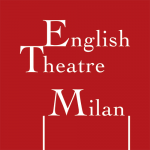On the seven hundredth anniversary of Dante Alighieri’s death
a multilingual Reading & Chanting:
Excerpts from the Inferno
on Zoom!
CIARAN CARSON’S translation of DANTE’S INFERNO
Wednesday, 15 December 2021 - 8pm BST (21h00 CEST)

Duration 75 min.
Introduced by Maggie Rose
Writer and Chair of British Theatre Studies, Milan University
“It’s seven hundred years since Dante Alighieri’s death and celebrations are going on around Italy and the world. As part of these festivities, Dante’s work is being re-read, re-interpreted and performed. This Zoom performance includes excerpts from a remarkable English translation by the late Belfast poet, Ciaran Carson, Dante’s original Italian verse, recited and sung, and from a Sardinian translation, recited and chanted by a Sardinian tenor: three possible interpretations of Dante’s Divine Comedy that place side by side three languages, namely English, Italian and Sardish. We include excerpts from the First Canto (the Prologue, the Wild Beasts); from the 5th (the tragic love of Paolo and Francesca), the 10th (Farinata); the 13th (Pier delle Vigne); the 26th (Ulysses); the 33rd (Count Ugolino of Pisa). When one reads these translations, one is brought to realise how important a ‘sense of place’ – in this case Belfast and Sardinia – can be to make Dante’s 14th century masterpiece resonate in the present”.
English reading: Stephen Sexton
Lecturer in Poetry – Queen’s University, Belfast
A POET AND ACADEMIC, STEPHEN DISCUSSES CIARAN CARSON’S TRANSLATION OF DANTE’S INFERNO (2003)
Since 1782 and the first translation into English of the Divine Comedy, more than 100 translations have followed. The late Ciaran Carson was a poet, musician and academic, whose translation of the Inferno (Granta, 2003) is a distinguished and remarkable work, where closeness to the original and creative freedom splendidly intertwine.


Italian reading and chanting of Dante’s verse: Sal Cabras
Translator and playwright, Milan
“At a time when writing and readership were the privilege of a tiny élite, a great poem like the Divine Comedy was conceived in rhyming tercets of eleven syllable lines so it could be memorized and chanted: it proved a powerful medium for sharing knowledge among a wide audience. In the poem the musicality of Tuscan and central-Italian melodies can be heard. Let’s discover again how it might have sounded.”

Sardish chanting: Martino Corimbi
Director of the ‘Cuncordu’ Choir, Orosei
PERFORMS THE SARDINIAN TRANSLATION OF THE INFERNO BY FATHER PAOLO MONNI

Donations are welcome! – BOOKINGS: info@EnglishTheatreMilan.org
Donations are welcome! – BOOKINGS: info@EnglishTheatreMilan.org

